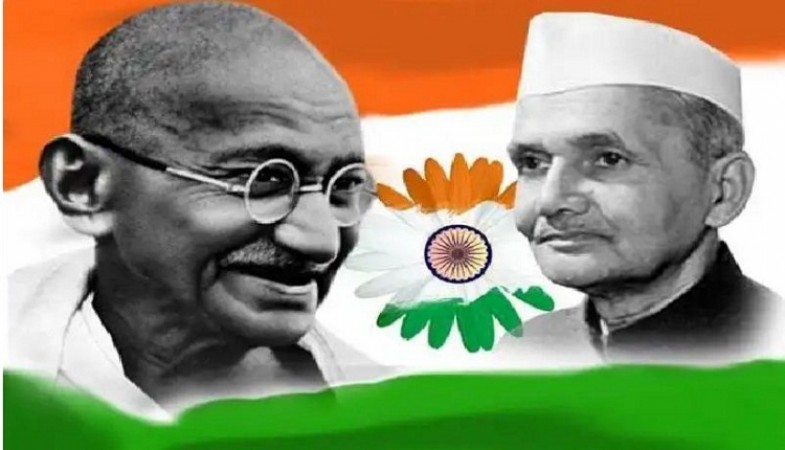
As India commemorates the birthdays of two of its most iconic leaders, Mahatma Gandhi and Lal Bahadur Shastri, on October 2nd, it's a fitting moment to ponder what these great statesmen might do if they were to return to the political landscape of India today. Their leadership and principles continue to inspire millions, and their vision of a united and harmonious India remains a guiding light. If Gandhi and Shastri were resurrected in today's India, no doubt, their first actions would likely focus on healing political divisions, fostering unity, and promoting ethical governance.
Mahatma Gandhi, the Father of the Nation, was a staunch advocate of non-violence, truth, and unity. He would likely be deeply concerned about the increasing polarization and divisive politics in India. Gandhi's first action would likely be a call for a renewed commitment to non-violence and tolerance. He would urge all political parties and leaders to engage in peaceful dialogue and find common ground, prioritizing the welfare of the nation over partisan interests.
Gandhi might also champion various social justice causes, such as poverty alleviation, education for all, and women's empowerment. His return could galvanize a nationwide movement for self-reliance and sustainability, emphasizing the importance of rural development and the revitalization of India's villages.
Lal Bahadur Shastri, known for his simplicity, integrity, and dedication to public service, would likely address the issue of corruption and ethical governance head-on. His first action might involve implementing stringent anti-corruption measures and promoting transparency in government.
Shastri would also be deeply concerned about the challenges posed by environmental degradation and climate change. He might advocate for sustainable development practices and the protection of India's natural resources, urging the nation to adopt eco-friendly policies for a greener future.
Both Gandhi and Shastri would emphasize the importance of inclusivity and unity in a diverse country like India. They would work towards bridging religious and cultural divides, promoting harmony among different communities, and ensuring equal rights and opportunities for all citizens.
Presumably, the return of Mahatma Gandhi and Lal Bahadur Shastri to the political landscape of India today would undoubtedly be a transformative moment. Their emphasis on non-violence, ethical governance, and unity would serve as a beacon of hope in a world characterized by division and discord. While their specific actions may vary, their overarching goal would be to steer India towards a path of progress, justice, and unity, in line with the timeless principles they stood for. Their legacy continues to remind us that, even in turbulent times, the values of truth, simplicity, and service to the nation should remain our guiding principles.
What Mahatma Gandhi to say: "You must be the change you want to see in the world." – His statement emphasizes the importance of personal responsibility and individual action in bringing about positive change in society.
"An eye for an eye makes the whole world blind." - Gandhi's commitment to non-violence and peaceful resistance is encapsulated in this powerful quote, highlighting the futility of revenge and retaliation.
"The best way to find yourself is to lose yourself in the service of others." - Gandhi's principle of selfless service underscores the idea that true fulfillment comes from helping and serving others.
"Happiness is when what you think, what you say, and what you do are in harmony." - This quote highlights the significance of living a life of integrity and alignment between one's thoughts, words, and actions.
"Freedom is not worth having if it does not include the freedom to make mistakes." - Gandhi's advocacy for individual freedom and the acceptance of human imperfections is evident in this quote, encouraging a tolerant and open society.
What more Lal Bahadur Shastri to say: "Jai Jawan, Jai Kisan" (Hail the Soldier, Hail the Farmer) - Shastri's slogan during a food shortage crisis in India reflects his deep respect for both those who defend the nation and those who feed it, emphasizing the importance of agriculture and national security.
"Among the major tasks before us, none is of greater importance for our strength and stability than the task of building up the unity and solidarity of our people." - Shastri's commitment to national unity and cohesion is evident in this quote, highlighting the vital role of solidarity in a diverse nation.
"We believe in peace and peaceful development, not only for ourselves but for people all over the world." - Shastri's dedication to peaceful coexistence and international diplomacy underscores India's role as a promoter of global peace.
"Discipline and united action are the real source of strength for the nation." - Shastri's emphasis on discipline and collective effort as the foundation of a strong nation remains relevant today.
"True democracy or the swaraj of the masses can never come through untruthful and violent means." - Shastri's unwavering commitment to democratic values and non-violence is evident in this quote, serving as a reminder of the importance of peaceful means in achieving political goals.
These visions and principles from Mahatma Gandhi and Lal Bahadur Shastri continue to inspire individuals and leaders worldwide to strive for a better, more just, and harmonious society. Wishing a heartfelt tribute to both Mahatma Gandhi and Lal Bahadur Shastri on their Jayanti, may their enduring legacies continue to illuminate our path toward a better India and a better world.